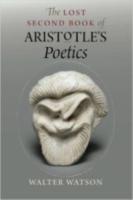
Chicago (2015) p/b 304pp £29 (ISBN 9780226875088)
This very engaging work sets out to save a whole treasure chest of priceless gems from an eternity in scholarly limbo, the chest being the lost second book of Aristotle’s Poetics. For some time now scholars have argued that a tenth century manuscript known as Tractatus Coislinianus summarizes this lost book, but up to now they have failed to establish the point conclusively. W. now hopes to succeed where philology on its own had not by making a philosophical case. His aim is to convince people that they will only fully appreciate the Poetics by accepting all of the Tractatus material as genuine Aristotle rather than, as one sceptic put it, no small amount of silly and extraneous material jumbled together with what is truly Aristotelian.
There is a deliberate intention to engage the general reader as much as the Aristotelian expert. The general reader in this case does not require any knowledge of Greek or indeed of Aristotle beyond some familiarity with the Poetics. Two chapters offer a general survey of Aristotle’s extant works in order to convey the idea that these works taken as a whole express a characteristically Aristotelian commitment to scientific rationality: each science is conceived as an autonomous field determined by its own internal principles, and this applies to poetics just as much as it does to more obvious candidates such as physics or biology. Later chapters go on to describe in detail the science of poetics and show how it is only fully realized with the inclusion of the disputed material.
The reader’s interest will be sustained by the open-ended way in which the account of poetics is developed. For example, modern technology does not render the Poetics obsolete. Cinematography is a poetic art of spectacle within the Aristotelian sense. Thus the remarks on comic dancing can best be understood by watching Charlie Chaplin films, and the poetic possibilities of the satyr play can be recognised in a classic Western such as High Noon. Similarly Aristotle’s category of historical poetry would now include anything that orders historical material for a poetic end, not just Tennyson but documentary film and reality television too. As an exercise in bringing ancient philosophy to life for the YouTube generation, this is pretty hard to beat.
Alan Towey—Holmewood House School
